Zeus' Transformations
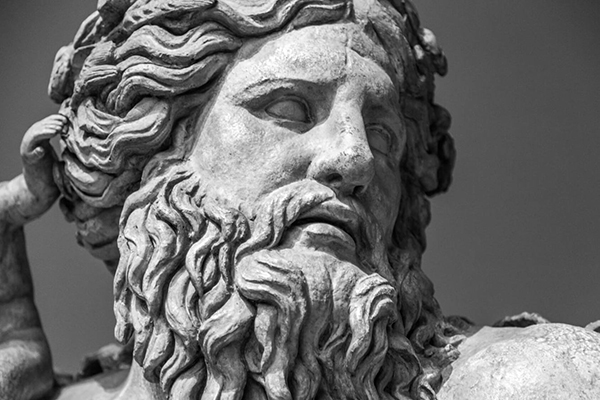
- "the mighty"
- "son of Kronos"
- "wide-seeing cloud-gatherer"
- "father of gods and men"
- "he of the dazzling bolt"
- "loud-thundering"
- "delighting in thunder"
- "aegis-holding"
- "he who marshals the thunderheads"
- or "Theos Agathos" (the Good God).
- "Lord of the Sky"
- "Oath-Keeper"
- "The Rain-God"
- "Lord of Justice"
- "Olympios"
- "Zeus Panhellenios" (Zeus of all the Hellenes)
- "Zeus Xenios" (Zeus, enforcer of Xenia)
- "Zeus Agoraios" (Zeus, guardian of the marketplace)
- or just "The Thunderer."
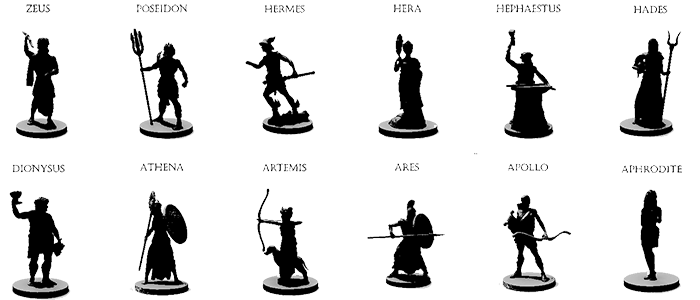
Persephone was seduced by Zeus when he took the shape of her abductor/husband, Hades.
Kallisto of Arkadia (southern Greece) was seduced by Zeus in the form of Artemis. In anger, Artemis transformed her into a bear, and she bore a son, Arkas. She was hunted down, but after her death transformed into the constellation Ursa Major.
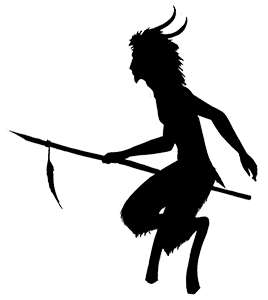
Antiope was seduced by Zeus in the shape of a Satyr. She bore him twin sons, Amphion and Zethos, who were left to die on the slopes of Mount Kithairon. However, shepherds came across the infants and raised them as their own. The boys were instructed by Hermes in various arts, with Amphion becoming a skilled bard and his brother Zethos a cattle-herder.

Mnemosyne, the goddess of memory (and the inventor of both single words and language), was seduced by Zeus in the guise of a shepherd. They had sex for nine straight nights; after over a year passed, she gave birth to the nine Muses at once, at the foot of Mount Olympus.

Zeus liked to take the form of absent husbands in order to have sex with married women. He took the form of Alkmene's husband, Amphitryon, and she had twins: Herakles by Zeus and Likmnios by Amphitryon.
Sources vary, but Zeus may have done the same thing with Dia, a queen in northern Greece, wife of King Ixion. Peirithoos, her son, could have been born from either union. And Queen Kalyke's son, Endymion, was fathered either by Zeus or King Aithlios, her husband.
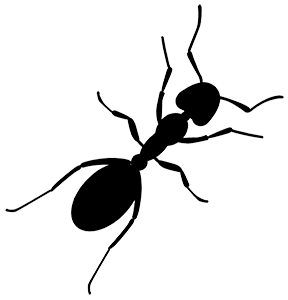
Zeus made himself as small as he could, and transformed into an ant in order to have sex with Eurymedousa, another princess in northern Greece. Their son was Myrmidon ("ant-man") and was the progenitor of the race of warriors that Achilles commanded in The Iliad.

The first time Zeus seduced Persephone, (sometimes the goddess of spring), he did so in the form of a serpentine dragon. She bore him a son, the god Zagreos, who was the first instantiation of Dionysus.
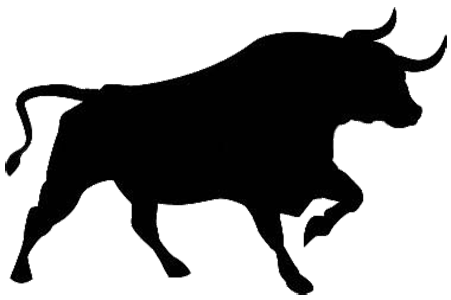
Europa, a queen in Northern Africa (Phoenicia), was abducted by Zeus in the form of a white bull. He took her to Crete, where they had three sons, Minos, Rhadamanthys, and Sarpedon. They were known for their fairness and became the three judges of the Underworld when they died. The Minoan civilization gets its name from its mythical founder, Minos.

This is perhaps the most ironic of Zeus' transformations for sex. He was in love with Hera, but she spurned his advances. So he created a thunderstorm and made himself into a cuckoo bird in distress. Hera felt pity for the bird, took it in, and held it to her breast to warm it. Zeus immediately turned back into his own form and raped her.
The cuckoo bird is so notorious for its cheating that it gave us the term for a man whose wife cheats on him, a "cuckold." The word derives from old French for a cuckoo ("cucu"). The females of some species of cuckoo lay their eggs in other birds' nests and leave them to bring up the offspring.
The word "cuckold" also implies that the husband is unaware of his wife's infidelities. And he might only find out on the arrival of a baby who is obviously not his child.

Whenever Zeus needed to abduct someone in a hurry, this was his go-to method. Aigina, a nymph in southern Greece, was abducted by Zeus in the shape of a eagle, and taken to the island of Aigina, where she bore him a son named Aiakos.
Perhaps the most famous eagle abductee is Ganymede, a prince of Troy, who was abducted to Mount Olympus to be Zeus' lover and cupbearer. by Zeus in the form of an eagle to be his lover and the cupbearer of the gods. He was often portrayed as the god of homosexual love and as such appears as a playmate of the other gods of love, Eros (Love) and Hymenaios (Marital Love). Plato calls him Himeros (Sexual Desire). He eventually is apotheosized into Aquarius, the Water Bearer.

Leda was a queen in southern Greece. Zeus raped her by taking the form of a swan. Her pregnancy resulted in her delivering two eggs: The first contained Helen and Pollux, fathered by Zeus. The second contained Klytemnestra and Castor, fathered by Tyndareus, Leda's husband.
Helen was given by the gods to Paris, thus starting the Trojan War. Klytemnestra closed the book on that war as she killed the victor, Agamemnon, when he returned home from it.
Castor and Pollux -- apotheosized into the constellation Gemini -- were considered the patrons of travellers, especially sailors, who used them to find fair winds. They were also great horsemen and boxers, and so athletes showed them particular devotion.
Some sources say that Zeus actually seduced Nemesis, the goddess of retribution, in the form of a swan, who then either laid the egg from which Helen was hatched, or gave the egg to Leda.

When her father imprisoned her in a brass chamber (because he feared he would be killed by one of her children), Danae was seduced by Zeus in the form of a shower of gold. Their union resulted in the hero Perseus.
Danae is the descendant of another of Zeus' victims, Io, whom he turned into a white cow so that he could avoid Hera's suspicion. But Hera knew what was up and had Io guarded closely, then inflicted by a fly that stung her so severely that she went mad and wandered throughout Europe and Asia, eventually ending in Egypt. There Zeus restored her human form.
ZEUS' OTHER LOVES
GODS
The goddess of love and beauty was pursued by Zeus when she first emerged from the sea, but she managed to escape him. According to some, she later had an affair with the god, and through the curses of Hera bore a deformed son: the god Priapos (most sources however say his father was Dionysos).
A Titan-goddess who was pursued by Zeus across the heavens. She assumed many forms to escape him, but eventually lept from the heavens in the shape of a quail, and metamorphosed into the island of Delos.
The goddess of agriculture and Zeus mated in the form of intertwining serpents. From this union the goddess Persephone was born (some say Dionysos was also their son).
A Titan-goddess who, according to some, bore Zeus the goddess Aphrodite (though most accounts say she was born in the sea, grown from the severed genitalia of Ouranos). An even rarer account makes her the mother of Dionysos, also by Zeus (again contrary to the usual tradition where Dionysos' mother is Semele).
A Titan-goddess who was the mother of the three Kharites (Graces) and, according to some, the river-god Asopos.
The goddess of the earth was accidentally impregnated by Zeus on two separate occasions: in Phrygia where she gave birth to the goddess Agdistis, and in Kypros where she bore the Kentauroi Kyprioi.
The Goddess of Excessive Pride was, according to some, the mother of Pan by Zeus (though he is usually called a son of Hermes and Penelopeia).
A goddess of music and one of the nine Mousai was, according to one account, the mother of the Korybantes (or Kabeiroi) by Zeus (however, these gods were usually called sons of some other god).
A Titan-goddess who was loved by Zeus. She bore him the twin gods Apollon and Artemis.
The Titan-goddess of good counsel was impregnated by Zeus, who then swallowed her whole upon learning of a prophecy that she was destined to bear a son greater than his father. She gave birth to Athena within the belly of the god, who later emerged fully grown from the skull of Zeus.
The goddess of the moon bore Zeus two daughters, Pandia and Ersa.
The goddess of the underworld river Styx was, according to one author, the mother of Persephone by Zeus (all other accounts say her mother was Demeter).
The Titan-goddess of custom and tradition was one of the first wives of Zeus. She bore him two sets of offspring: the three Horai (Seasons), representing Justice, Peace, Good Governance, the three Moirai (Fates), and in some accounts, of three prophetic Nymphs.
A Nereid-goddess of the sea who was pursued by Zeus. The god abandoned his attempts to seduce her when it was revealed that she was destined to bear a son greater than his father.
DEMI-GODS
The Epimelid-nymph wife of the god Pan who assumed the form of a she-goat to escape the attentions of Zeus. The god seduced her in this form and she bore him the godling Aegipan (Goat-Pan).
A Naiad-nymph of the River Borysthenes in Skythia (northeastern Europe) who was loved by Zeus and bore him a son Targitaus.
The nymph mother by Zeus of other Nymphs.
A Pleiad-nymph of the island of Samothrake (Greek Aegean), who was loved by Zeus and bore him several sons: Dardanos, Emathion, Iasion.
A nymph of the Island of Rhodes (Greek Aegean) who bore Zeus three sons named Spartaios, Kytos, and Kronios.
A nymph of the Tauric Khersonese (northeastern Europe) who was loved by Zeus and bore him a son, Kolaxes.
A Naiad-nymph of the Argolis (southern Greece) who was loved by Zeus. She was transformed into a heifer by Zeus and driven under torment by Hera all the way to Egypt (North Africa). There she bore Zeus a son, Epaphos. Some say that she also gave birth to a daughter on the Straits of Bosporos (Asia Minor) named Keroessa.
A Naiad-nymph of Akarnania (in central Greece) who was loved by Zeus. No offspring are mentioned of their union, although she did obtain favors from the god for her sons fathered by mortals.
An agricultural nymph and lady of Krete (Greek Aegean) or princess of Phoinikia (West Asia) who was loved by Zeus and bore him a daughter named Britomartis.
A Pleiad-nymph of Arkadia's Mount Kyllene (southern Greece). She was loved by Zeus and bore him the god Hermes.
A nymph of the land of the Moors (North Africa) who was the mother of Iarbos by Zeus.
A Naiad-nymph of Megaros (southern Greece), one of the Sithnides. She was the mother by Zeus of Megaros.
A nymph of the island of Samothrake (Greek Aegean) who, according to some, was the mother of Saon by Zeus.
A Nymphe of Malis (northern Greece) who was loved by Zeus and bore him a son named Meliteus.
An Okeanid-nymph and minor goddess of wealth who bore Zeus a son named Tantalos.
A Naiad-nymph of the Argolis (southern Greece) who was abducted and taken to Assyria (in Asia Minor) by Zeus. He promised her the fulfillment of a wish, and she declared "I wish to remain a virgin."
A Pleiad-nymph of Lakedaimonia's Taygetos mountain range (southern Greece). She was loved by Zeus and bore him a son named Lakedaimon.
A nymph of Sicily (southern Italy) who was loved by Zeus and prayed that he hide her beneath the earth to avoid the jealous wrath of Hera. Their sons were the twin Palikoi gods. (According to others, the Palikoi were sons of Hephaistos).
MORTALS
A queen of the Lapith tribe of Thessalia (northern Greece), wife of King Ixion. According to some, she was seduced by Zeus, and bore him a son Peirithoos (but others say the father was her husband, Ixion).
A princess of Orkhomenos (central Greece) who was loved by Zeus. In fear of the wrath of Hera, he hid her beneath the earth, where she gave birth to a son, the Gigante Tityos.
A queen of Elis (southern Greece), the wife of King Aithlios. She was the mother by Zeus (or by her husband Aithlios) of Endymion.
A lady of the island Krete (Greek Aegean) who bore Zeus a son named Atymnios.
A queen of Libya (North Africa) who was loved by Zeus. When Hera stole her children by the god—Herophile and Akhilleus—she was driven mad with grief.
A princess of Lykia (Asia Minor) who was loved by Zeus and bore him a son, Sarpedon.
A woman who bore Zeus a son named Herakles (not the hero).
A princess of Argolis (southern Greece). She was the very first mortal woman loved by Zeus, and bore him two sons: Argos and Pelasgos (though according to others Pelasgos was a son of Poseidon).
An historical queen of Macedonia, the mother of Alexander the Great. According to legend, her son was fathered by Zeus.
A princess of the Hellenes, one of the daughters of King Deukalion, surviver of the Great Deluge. She was loved by Zeus and bore him two sons, Latinos and Graikos.
Another princess of the Hellenes and daughter of King Deukalion. She was loved by Zeus and bore him a son, Aithlios.
The wife of King Deukalion of the Hellenes, who with her husband survived the Great Deluge. According to some, her first-born son, Hellen, was fathered by Zeus rather than Deukalion.
A princess of Thebes in Boiotia (central Greece) who was loved by Zeus, but through the machinations of Hera was consumed by the heat of his lightning bolts. Zeus rescued their unborn son, Dionysos, from her body and sewed him up in his thigh until he was old enough to be born.
Yet another princess of the Hellenes and daughter of King Deukalion. She was loved by Zeus and bore him two sons, Magnes and Makedon.